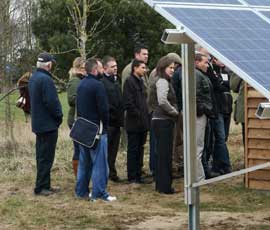Crash course in renewables technology

Young poultry farmers were given a crash course in renewables technology – and reminded of the importance of energy efficiency at the latest Poultry Industry Programme (PIP) session.
Organised by the NFU with feed compounder ABN, the day was held at Nigel Joice’s broiler farm near Uphouse, Norfolk. Mr Joice showcased his biomass boilers, and a brand new array of 1,800 solar panels planted over three sites. A 5kW wind turbine was also installed for the day.
The PIP scheme is aimed at educating young poultry professionals, who the NFU hopes “will end up becoming some of the industry’s future leaders”.
The farm has two 500kW biomass boilers designed to burn poultry litter, as well as woodchip. Currently litter cannot be burnt on-farm, but this is something Mr Joice hopes to help change. He is nearing the end of licensed trials burning poultry litter, assessing its environmental impact, which he said were showing “excellent results”.
The boilers were supplied, and are managed remotely by BHSL, based in Ireland. Patrick Dight, IT and applications director for the firm, said that the system was able to meet 90% of the site’s historic LPG use, using litter produced by the farm’s 840,000 broilers.
The PIP participants also toured Mr Joice’s solar pv system, consisting three separate 150kW pv installations by Norwich firm RenEnergy. Although they had only recently come on-line, the firm has estimated daytime peak power would provide 80-90% of the electricity requirements for the farm.
Windcrop also built a 5kw small-scale turbine on the farm for the day. General manager Richard Moody said: “The adoption of renewable energy will help the industry’s up-and-coming talent to continue building innovative, profitable and sustainable businesses for the future.”
Jonathan Scurlock, chief adviser on renewable energy and climate change for the NFU, said that agriculture had a great opportunity to refresh its image by embracing renewable technology.
“We can certainly provide a significant amount of clean renewable energy in a decarbonising economy, and we can do this without compromising food production.”
He added that the rewards for investing were both financial, pointing to particularly good returns on investment available for solar pv, and often gave a farm a better image.
Andrew Kneeshaw, managing director at the Farm Energy Centre (FEC), reminded PIP participants to keep energy efficiency in mind. “Save it first, generate it afterwards,” he said. Mr Kneeshaw added that farms he visited were almost always able to save energy in some way. FEC collected data from 145 poultry farms and found the best used around seven times less heat energy in kWh than the worst.
Young poultry farmers quiz ministers
